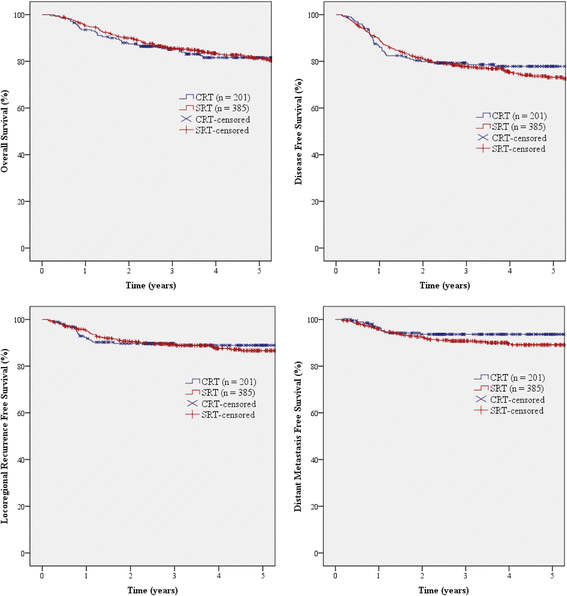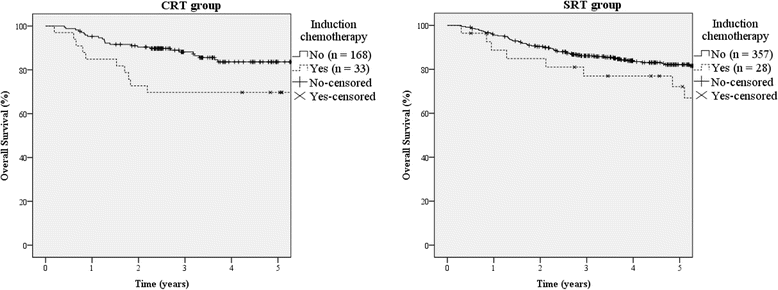Chemoradiotherapy versus surgery followed by postoperative radiotherapy in tonsil cancer: Korean Radiation Oncology Group (KROG) study
- PMID: 28854890
- PMCID: PMC5577763
- DOI: 10.1186/s12885-017-3571-3
Chemoradiotherapy versus surgery followed by postoperative radiotherapy in tonsil cancer: Korean Radiation Oncology Group (KROG) study
Abstract
Background: Treatment of tonsil cancer, a subset of oropahryngeal cancer, varies between surgery and radiotherapy. Well-designed studies in tonsil cancer have been rare and it is still controversial which treatment is optimal. This study aimed to assess the outcome and failure patterns in tonsil cancer patients treated with either approaches.
Methods: We retrospectively reviewed medical records of 586 patients with tonsil cancer, treated between 1998 and 2010 at 16 hospitals in Korea. Two hundred and one patients received radiotherapy and chemotherapy (CRT), while 385 patients received surgery followed by radiotherapy and/or chemotherapy (SRT). Compared with the SRT group, patients receiving CRT were older, with more advanced T stage and received higher radiotherapy dose given by intensity modulation techniques. Overall survival (OS), disease-free survival (DFS), locoregional recurrence-free survival (LRRFS), distant metastasis-free survival (DMFS), and clinicopathologic factors were analyzed.
Results: At follow-up, the 5-year OS, DFS, LRRFS and DMFS rates in the CRT group were 82, 78, 89, and 94%, respectively, and in the SRT group were 81, 73, 87, and 89%, respectively. Old age, current smoking, poor performance status, advanced T stage, nodal involvement, and induction chemotherapy were associated with poor OS. Induction chemotherapy had a negative prognostic impact on OS in both treatment groups (p = 0.001 and p = 0.033 in the CRT and SRT groups, respectively).
Conclusions: In our multicenter, retrospective study of tonsil cancer patients, the combined use of radiotherapy and chemotherapy resulted in comparable oncologic outcome to surgery followed by postoperative radiotherapy, despite higher-risk patients having been treated with the definitive radiotherapy. Induction chemotherapy approaches combined with either surgery or definitive radiotherapy were associated with unfavorable outcomes.
Keywords: Adjuvant radiotherapy; Chemoradiotherapy; Induction chemotherapy; Surgery; Tonsil cancer.
Conflict of interest statement
Ethics approval and consent to participate
The study protocol was reviewed and approved by the Institutional Review Boards of all participating hospitals, and adhered to the tenets of the Declaration of Helsinki. Owing to retrospective approach of this study, the need for informed consent was waived by the ethics committees. Additional information about the ethics committees and waiver of informed consent is provided in Additional file 1.
Consent for publication
Not applicable.
Competing interests
The authors declare that they have no competing interests.
Publisher’s Note
Springer Nature remains neutral with regard to jurisdictional claims in published maps and institutional affiliations.
Figures
References
-
- Park G, Lee SW, Kim SY, et al. Can concurrent chemoradiotherapy replace surgery and postoperative radiation for locally advanced stage III/IV tonsillar squamous cell carcinoma? Anticancer Res. 2013;33:1237–1243. - PubMed
MeSH terms
LinkOut - more resources
Full Text Sources
Other Literature Sources
Research Materials



